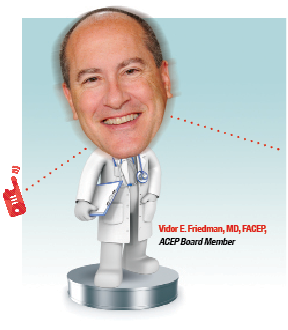
—Debra G. Perina, MD, FACEP, ACEP Board Member
Explore This Issue
ACEP Now: Vol 33 – No 04 – April 2014How do we ensure it does not appear to only be about protecting physicians?
Who would need to recognize the safe harbor? The courts? In every state?
Feds have seemed very uninterested in addressing liability concerns. Then again, if it was a matter of saving them money, they may take more interest.
—John J. Rogers, MD, FACEP, ACEP Board Member
Defensive medicine is an expensive and unnecessary part of medical practice that does not benefit patients. But doctors have to do it because of the unreasonable and out-of-control liability environment.
— ACEP Executive Director Dean Wilkerson, JD, MBA, CAE
I’d like to see the first five EM safe harbors introduced this fall at ACEP14. In being good partners in the house of medicine, I’d like to invite the other specialties to similarly submit safe harbors that improve patient safety and decrease health care costs. Consumer Reports partnered with Internal Medicine. I wonder if The Wall Street Journal, USA Today, or someone else representing consumers, even [the Pacific Business Group on Health] or the Institute of Medicine, might want to jump in and partner with us. It might be nice to ask [former Secretary of State] Hillary Clinton and [NJ Governor] Chris Christie to be honorary board members. Now that would be interesting to see what they say to being on a panel that has the serious potential to decrease health care costs.
I think we should push forward the “Safe Harbors Are Smart Medicine” campaign or whatever it ends up being called.
I think if we find the right partner(s), we can accomplish this to everyone’s benefit, other than the trial attorneys. Government wins with less costs, employers win with less costs, health care plans win with less costs, patients win with low-yield tests not being done, and physicians win by decreased anxiety, decreased time doing tests, being able to treat more patients, and improved access.
Having ACEP establish safe harbors may be an actual solution rather than just PR. ACEP has been pushing the envelope since before our inception. Let’s be bold.
—Paul D. Kivela, MD, FACEP, ACEP Secretary-Treasurer Dean, et al.

Perhaps the article has served us well by driving our attention to this issue.
With respect to safe harbors, the Choosing Wisely recommendations are a good start, as you must have an evidence-based recommendation to create the safe harbor of professional liability protection around. In addition, safe harbors must be drafted by intent and not implied via common sense. For instance, it makes perfect sense to avoid unnecessary head CTs per our recommendation. However, the Choosing Wisely recommendation would provide an excellent platform for defense but is a far cry from a safe harbor, which should be crafted to avoid all liability if followed. The plaintiff’s burden would then be to prove that the safe harbor does not apply or is not applicable to the facts in question. The policy would need a safe harbor provision, and that policy would have to become law, from my perspective. The tort of negligence is handled at the state level. However, I do believe that preemption is possible if this were tied to a federal program such as the ACA [Affordable Care Act] (ie, value-based payment modifier).





No Responses to “ACEP Reacts to Issue of Creating Safe Harbor Protections for Following Clinical Guidelines”